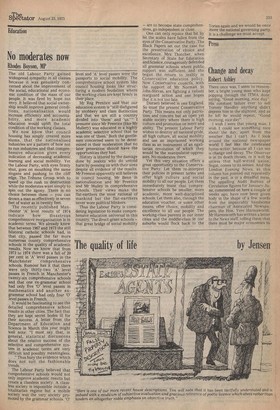Education
No moderates now
Rhodes Boyson, MP
The old Labour Party gained widespread sympathy in all classes because it was genuinely concerned about the improvement of the social, educational and economic condition of the mass of our people. It was fired by hope not envy. It believed that social ownership would improve general conditions, nationalisation would increase efficiency and 'accountability, and more academic education would uplift the total condition of the working classes.
We now know that council housing has simply created more slums, that the nationalised industries are a pattern of how not to run industries and that comprehensive education gives every indication of decreasing academic, learning and social mobility. Yet the Labour Party, with eyes firmly shut, goes on mouthing the same slogans and pushing to the cliff edge. The Tribune Group wish to speed up the rush to destruction while the moderates want simply to spin out the agony. There is no choice between them — you can drown a man as effectively in seven feet of water as in twenty feet.
The recently published Manchester 'A' level results of 1974 indicate how disastrous comprehensive reorganisation is in academic terms. We already knew that between 1967 and 1973 the still bilateral catholic schools had, in that city, passed the far more numerous county comprehensive schools in the quality of academic results. Now we know that from 1973 to 1974 there was a fall of 20 per cent in `A' level passes in the Manchester comprehensive schools. Rumour has it that there were only thirty-two 'A' level passes in French in Manchester's twenty-six comprehensive schools and that one ex-grammar school had only five '0' level passes in mathematics and another exgrammar school had only four '0' level passes in French.
It would be fascinating to see the detailed comprehensive school results in other cities. The fact that they are kept secret bodes ill for their success. A letter from the Department of Education and Science in March this year might well note: "I must say that, in general, statistical discussions about the relative success of the selective and comprehensive system in academic terms are very difficult and possibly meaningless. . . ." Thus bury the evidence which does not suit the fashionable trends.
The Labour Party believed that comprehensive schools would not only improve academic results but create a classless society: A classless society is impossible outside a totalitarian regime but a mobile society was the very society promoted by the grammar schools. '0' level and 'A' level passes were the passports to social mobility. The comprehensive school system like council housing looks like structuring a modern feudalism where the working-class are kept firmly in their place.
Mr Reg Prentice said that our education system is "still disfigured by snobbery and class distinction and that we are still a country divided into 'them' and 'us.'" I presume since Mr Prentice (like Mr Mullery) was educated in a highly' academic selective school that he was one of 'them.' Both the gentlemen concerned seem to be determined in their moderation that no later generation should hive the opportunities they had. History is littered by the damage done by zealots who do untold harm by pressing on with their aims despite all evidence of the results. Mr Freeson apparently still believes in council housing, Mr Benn in nationalisation and Mr Prentice and Mr Mulley in comprehensive schools. Their views make the flat-earthers the most rational of mankind but the flat-earthers never wore political blinkers.
Thus the Labour Party is considering legislation to make comprehensive education universal in this country. The direct-grant schools — that great bridge of social mobility — are to becouie state comprehensives, go independent or close.
One can only rejoice that hit by bit the scales have fallen from the eyes of the Conservative Party. The Black Papers set out the case for the preservation of choice and excellence. Mrs Thatcher, when Secretary of State for Education and Science, courageously defended all grammar schools where public support was sufficient and she began the return to reality in Conservative education policy. Now Conservative councils, with the support of Mr Norman St John-Stevas, are fighting a valiant rearguard action and one hopes that it is not too late.
Disraeli believed in one England. So must the present Conservative Party. This means not only patriotism and concern but an open yet stable society where there is high culture and promotion on merit and ability. The present Labour Party wishes to destroy all national pride, all high culture, all social mobility and use an imprisoned working class as an instrument of an egalitarian revolution of which they would be the manipulator-oppressors. No moderates there.
Yet this very situation offers a great opportunity to the Conservative Party. Let them re-interpret their policies in present terms and offer high culture and social mobility to all our people. Let them immediately insist that comprehensive schools be smaller, more academic, more well-disciplined schools. Let them also, through the education voucher, or some other means, offer choice, mobility and excellence to all our people. The working-class parents in our inner cities and the middle-class in our suburbs would flock back to the Tories again and we would be once more the national governing party. It is a challenge we must accept.


































 Previous page
Previous page